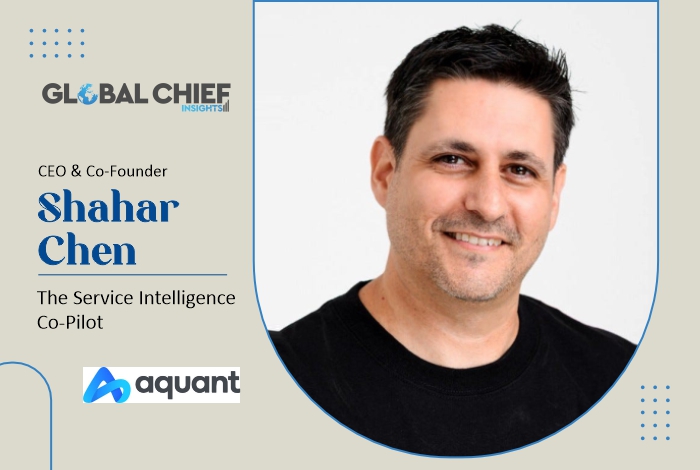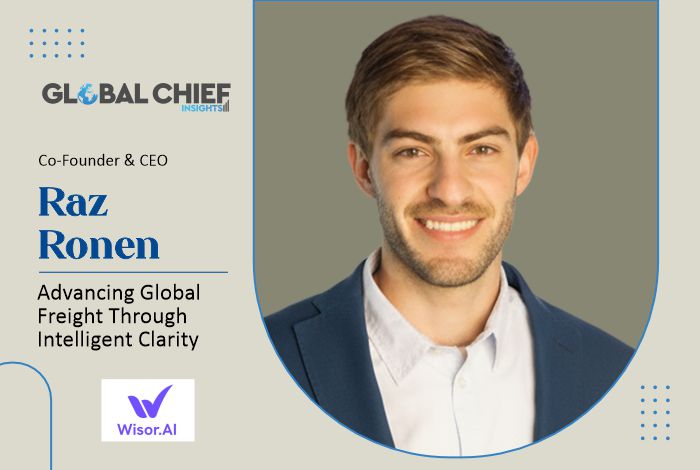Aquant: The Service Intelligence Co‑Pilot


How AI is turning field service teams into experts on demand
Aquant started with a challenge: field technicians carry decades of experience in their heads, experience that is retiring or leaving with people. Shahar Chen, CEO and co‑founder, and his co‑founder Assaf Melochna saw that within service organizations lies hidden gold, data collected during every service ticket, call, and technician note. Their idea was simple: teach AI to make that expertise instantly accessible to any technician, anytime, anywhere.
They founded Aquant in 2016. By combining real-world service data with AI reasoning, the platform acts like a co‑pilot. It guides newer field technicians through complex troubleshooting, helps identify training opportunities, and helps managers spot patterns in service performance without needing a team of data scientists.
What this really means is that a technician with six months on the job can solve a problem that would traditionally take decades of experience. One story shared by Chen notes a junior technician fixing an MRI unit in ten minutes, a task that would normally require thirty years of hands-on experience.
Aquant works across industries, medical devices, industrial machinery, and high tech equipment, delivering AI-powered incident diagnosis, predictive maintenance, and customer insights that reduce downtime and reshape service workflows.
Security and trust matter deeply to Chen. The AI platform is built to keep sensitive data secure and explainable, a key feature in industries like healthcare where privacy and precision cannot be compromised.
Today Aquant helps companies shift from reactive, break fix models to proactive, data driven service. It frees up experts to focus on high value work while ensuring that institutional knowledge stays with the organization, embedded within the AI.
Shahar Chen’s vision is clear: make service organizations smarter by turning every technician into an expert and every piece of service data into actionable insight. This is not about replacing technicians. It is about giving them the answers they need, exactly when they need them.
Origin Story: Why Shahar Chen Built Aquant
Shahar Chen grew up in Israel, dismantling computers in his youth and dreaming about how things work. That early fascination steered him toward a career in SaaS, where he spent over a decade, including leadership roles at ClickSoftware. Together with his cofounder Assaf Melochna, he set out to solve a critical service industry problem: the widening skills gap that leaves field teams underprepared for increasingly complex machinery.
They recognized that companies generate enormous volumes of service data such as work orders, technician notes, and customer interactions, but most of it remains buried. Aquant’s mission became harnessing AI to unlock that value and democratize institutional knowledge for service teams everywhere.
In one interview, Chen says AI found him, meaning it revealed itself as the logical answer after identifying skill shortages and fragmented data resources. Their goal went beyond automation; they envisioned an AI driven copilot that empowers technicians, contact agents, and service leaders alike to perform with expert-level precision even without decades of experience.
So Aquant began building a generative AI platform built for field service, which they call Service Intelligence, which learns from historical signals, expert fixes, and patterns buried in free text and structured logs. The platform does not replace human expertise; it amplifies it, acting as a coach in the service workflow.
What this really means is that Aquant’s foundation was not hype. It was practical and purposeful. They understood the terrain of field service, from industrial equipment maintenance to medical device support, and built generative AI tailored to those use cases. Chen’s leadership now focuses on scaling that mission across industries where downtime costs millions, expertise is scarce, and customer expectations are unforgiving.
The Expertise Gap: Why Field Service Needs AI
Field service organizations face a perfect storm: a retiring workforce, increasing equipment complexity, and rising customer expectations. Aquant’s 2025 Field Service Benchmark Report highlights the Service Expertise Gap, which quantifies performance disparities between top and bottom technicians. It shows top performers resolve issues 39% faster, deliver a first time fix rate of 86% versus 53%, and incur far fewer unnecessary dispatches, just 3% compared to 24% for laggards.
As equipment becomes more sophisticated, obsolete tribal knowledge held by veteran technicians is slipping through organizational cracks. Aquant saw this challenge as an opportunity. Their platform captures that tacit knowledge, assimilates it into AI models, and surfaces it to junior technicians or agents in real time, leveling the playing field. One client saw a 75% acceleration in onboarding time, a 22% boost in first time fix rate, and a 17% lift in remote resolution through Aquant’s tools.
What this really means is that companies using Aquant do not just become incrementally better. They fundamentally shift how expertise flows through their service teams. Rather than relying on trial and error or ad hoc mentorship, AI analyses historical data and diagnoses root causes ahead of time. Dispatchers send the right technician with the right parts. The system predicts possible failure modes. Service reps troubleshoot issues immediately with guided prompts before escalation.
That intelligence, which connects data, expertise, and decisions, is what Aquant calls Service Intelligence. It is engineered to shrink resolution times, reduce truck rolls, and lower operating costs, and ultimately close the gap between novice and expert technicians for good.
How Aquant Platform Works: Intelligence in Action
Aquant’s platform ingests data from CRMs, parts catalogs, technician notes, work orders, service histories, and even free text logs. It then uses machine learning via natural language processing and prescriptive analytics to recommend prioritized workflows, root cause diagnostics, and even parts requirements before a technician sets foot onsite.
One core capability is service triage. The system prompts service agents with dynamic checklists, guiding them through likely troubleshooting paths while capturing pertinent information. Dispatch is then optimized. The right skills, the right parts, and the right technician reach the right location faster.
Another key feature is parts pickup optimization. Based on predicted failure modes and technician location, Aquant’s AI recommends part staging at depots or trucks. This reduces repeat visits and increases first time fix rates, an area where many service organizations stagnate around 70% success rates. Aquant customers often break the 85 % threshold.
Self service is also part of the mix. Up to one third of service queries can be resolved without human intervention. Aquant integrates those insights into customer portals or chatbots, reducing calls and unnecessary dispatches and enabling a shift left approach to support.
What this really means is that Aquant does not just automate processes. It prescribes them. When failures arise, AI surfaces the most likely causes and recommended repairs. Managers see real time metrics. Analysts spot knowledge gaps. Trainers can deliver focused coaching. It becomes a closed learning loop, improving with each interaction.
AI as Copilot: Augmenting, Not Replacing Humans
Aquant has always positioned its AI as augmentation rather than replacement. At the Tech Innovation CUBEd Awards in March 2025, cofounder Assaf Melochna emphasized that technicians get an AI coach, not a robot taking their job. The system directs human decision makers, not overrides them.
Shahar Chen echoes this in interviews. He says AI acts as a copilot in critical workflows, helping new technicians tackle sophisticated issues quickly. He recalls how a technician with minimal experience repairing MRI machines could resolve problems in minutes with guidance from Aquant’s platform, expert-level results delivered safely and effectively.
This approach eases the fear that AI will displace service roles. Instead, Aquant promotes trust. Systems are explainable, and human in the loop review is integral. Organizations build confidence in recommendations before relying on them. This collaborative dynamic ultimately raises both productivity and employee satisfaction.
What this really means is that Aquant fosters acceptance through transparency. Users see why the AI recommends specific actions, can override them, and feed results back. That feedback improves future predictions. AI becomes a tool, not a black box. Teams scale expertise without overloading veteran techs and preserve human judgment when stakes are high.
Benchmark Report Insights: Results That Matter
The 2025 Field Service Benchmark Report from Aquant analyzed nearly 160 organizations and 600,000 service records, revealing stark differences between leaders and laggards. Top performers see resolution times three days faster on average, first time fix rates 33 points higher, and avoidable dispatch rates reduced from 24% to just 3% versus low performers.
Further, they found that a one percent increase in remote resolution could save 1.1 million dollars annually. The total cost gap between highest and lowest performers reached up to 1.8 million dollars per organization. That is staggering and underscores the economic value of AI driven efficiency and remote troubleshooting.
Service queries are also changing. One third can now be resolved via self service tools. That shift cuts call center costs and speeds resolution. It aligns directly with Aquant’s Shift Left strategy, which empowers customers and entry level agents to solve more issues early, while ramping down truck rolls and expensive field visits.
What this really means is that Aquant’s tools deliver measurable ROI. Organizations closing the expertise gap deliver faster, cheaper, and more accurate service. They wring more productivity from existing staff, reduce reliance on field labor, and protect profit margins in tight, competitive industries. Aquant’s benchmarks give clients a roadmap to that transformation.
Training and Onboarding: AI Driven Upskilling
Aquant leverages AI not only for real time support but also to revolutionize technician training. With nearly half of North American field technicians over age 50 and retirements accelerating, onboarding new hires has become a bottleneck. Traditional knowledge transfer is failing under time constraints and workforce turnover.
Their AI powered training platform reduces time to competency by 50% on average. In one Ricoh case, remote onboarding times shrank by 75%. The same initiative boosted remote resolution rates by 17% and first time fix rates by 22%. These gains reflect how AI accelerates learning curves while preserving service quality.
The system identifies performance gaps across teams, flags where incoming technicians need coaching, and tracks progress. AI analytics prioritize the most critical training topics, helping managers focus limited resources on high impact areas. For example, fault diagnosis on complex equipment rather than generic training.
What this really means is that Aquant turns onboarding into a scalable, data driven process. Instead of pairing every new hire with a senior tech, companies can rely on AI nudges, guided diagnostics, and expert-level prompts to build competence quickly. Retention improves, training costs drop, and expertise becomes part of the institutional memory rather than stuck in human heads.
Industry Reach: Where Aquant Makes an Impact
Aquant serves industries that rely on complex machinery: manufacturing, medical devices, industrial equipment, food service gear, electronics, high tech printing, and appliances.
Clients include major OEMs like Canon, John Deere, Johnson and Johnson, HP, and Hologic. These companies face critical service demands where downtime is costly, and errors are not an option. Aquant’s platform helps them reduce downtime, improve uptime, and elevate customer experience at scale.
In news coverage, Aquant is highlighted for tackling predictive maintenance and optimizing inspections by splicing sensor data with AI and technician notes. Clients like Coca Cola and Siemens Energy reportedly save up to 23% annually in service costs through AI foresight and smarter dispatch decisions.
What this really means is Aquant is not pigeonholed. Their approach spans field service, contact centers, remote support teams, and customer self service channels. The common denominator is complexity, where knowledge matters, speed matters, and mistakes cost more than just money.
Future Vision: Personalized, Secure AI at Scale
Aquant is focusing on generative AI that respects privacy and adapts to enterprise constraints. Shahar Chen points out that in regulated industries like medical devices, AI must operate without sending sensitive PHI or PII to the internet. Aquant has engineered solutions to ensure models run securely on prem or in private clouds, with no external data exposure.
Beyond privacy, the platform is evolving toward agentic AI. It acts with autonomy where appropriate, but remains explainable and responsive to feedback. This is not set it and forget it. It learns continually from service outcomes, user corrections, and performance metrics.
In public commentary, Chen and Melochna emphasize accessibility. Future AI is not about autonomy. It is about being available under strict control. It is about resilience in offline mode, strong performance across shifting environments, and providing expert-level assistance anywhere, on demand.
What this really means is that Aquant is evolving into a platform where AI becomes a strategic asset, not a risk. Organizations can deploy intelligent support at scale, accelerate remote resolution workflows, and democratize high level expertise across their workforce, all while keeping sensitive data secure.




